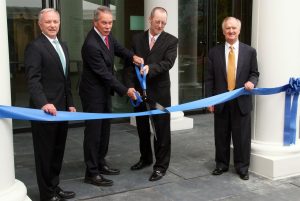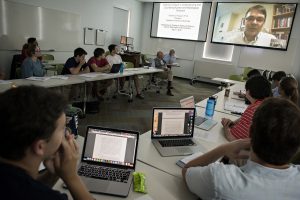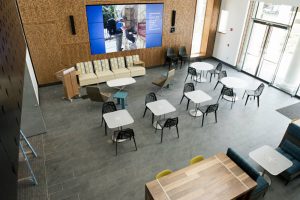Washington & Lee Dedicate The Center for Global Learning
Washington and Lee’s new Center for Global Learning began as a vision nearly a decade ago, a concept for a unique space that would embody the university’s evolving global studies program. That vision is now a reality, manifested in brick and mortar, contemporary design and cutting-edge technology.The building was officially dedicated on May 13, with a ceremony that included remarks from Rector J. Donald Childress, President Kenneth P. Ruscio, and Mark Rush, the director of International Education and the Stanley D. and Nikki Waxberg Professor of Politics and Law.
“Not only does the mere presence of such a space signal to everyone the importance we place on this element of the curriculum,” said Ruscio at the dedication ceremony, “it also serves as a clear signal to our students about the critical importance of a global perspective as they prepare for the lives of consequence we hope and know they will lead in the world.” The facility, which combines 8,600 square feet of renovated duPont Hall with 17,700 square feet of new space, is “a physical manifestation of an ever-growing part of the education we provide at Washington and Lee,” said Ruscio. It houses classrooms, seminar rooms, instructional labs, and offices for language departments, visiting international scholars and the Office of International Education. Among the new teaching facilities are global discovery laboratories, where innovative resources can be used to harness the expertise of scholars across the globe, and to promote the study of geography, ecology and the environment.In addition, a large glass-walled atrium and adjoining garden and courtyard flow seamlessly, bringing the outdoors in, encouraging student-faculty interaction, and providing a venue for special events.
The first classes were held in the renovated duPont space beginning in the winter term despite ongoing construction on the back of the building, and the garden and atrium served as the setting for the dedication ceremony.Carole Bailey, the university’s senior project manager, responsible for overseeing construction of the building, explained what they hoped to achieve with the building and grounds, and how that fit into the more traditional campus setting. “We wanted to create a space like none other on campus, contemporary but still very elegant and approachable,” Bailey said. “Students are loving it so far.” While the building itself is impressive, several of its most significant characteristics are more subtle. Mostly hidden behind the walls and in discreet closets are servers and cables, neatly tucked out of sight. This new technology provides students and faculty with connectivity to the world at large, through high-quality, easy-to-use video conferencing equipment in the classrooms and a state-of-the-art multiplex in the atrium. The atrium’s multiplex features a large display comprising nine integrated screens, mounted on back-lit, perforated cherry paneling, that have the potential to simultaneously display content from nine individual feeds from around the world.Other noteworthy characteristics of the building are also hidden in plain view: in the beautifully landscaped outdoor plaza, in the flexibility of the rooms and common areas, in the meticulously selected materials and décor, and even in the shape of the building’s corridors.
“When you come to this part of campus, you start a journey,” said Laurent (Larry) Boetsch, retiring professor of Romance languages and the former director of International Education. “Like a river, everything is curved and winding, with wide sections and narrow sections. The narrow sections naturally pull people together, where they engage with one another, leading to collaboration.” In those narrows are strategically placed seating areas, where students, faculty and visiting scholars are drawn to sit and linger. Flexible classroom layouts are more accessible and allow faculty to experiment with new ways of teaching and connecting. Common areas also provide flexibility, with furniture that moves around to create nooks and crannies, and interesting places for members of the campus community to gather in a casual environment. The Tea House, which is scheduled to open in the building’s atrium in the fall, will also be a means to draw people to the far north end of campus. “This corner of campus has been transformed,” said Rush. “I’m excited to see what sort of gathering place the building becomes.” All of this adds up to much more than just a building. “It was truly intended to be a place of distinction on campus, to bring people together across all departments, and to provide a global perspective,” Boetsch said.
As described in a quote from Jorge Luis Borges’ “The Aleph,” which served as an anchor during the construction process, continually connecting the project back to the vision, the Center for Global Learning is indeed a “place where, without admixture or confusion, all the places of the world, seen from every angle, coexist.” “Global learning is for us not just a phrase, not just a trend, not just a building,” said Ruscio. “It is an essential part of a Washington and Lee education. It will happen throughout the campus, and indeed throughout the world, but especially here in this splendid new space.”
by Drewry Sackett | dsackett@wlu.edu




